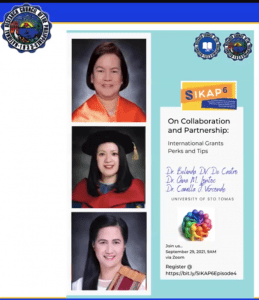The National Research Council of the Philippines (NRCP) Division 1 – Governmental, Educational and International Policies, invited UST faculty members and RCSSED researchers Dr. Gina Lontoc and Dr. Camilla Vizconde, and Director Dr. Belinda de Castro to speak during the SIKAP webinar series on September 29, 2021.

With the topic, “On Collaboration and Partnership: Tips and Perks of International Grants,” the team was chosen for its ability to conduct research, to source and acquire research grants, and to promote and publish research outputs.
Vizconde, who is concurrently the UST Graduate School Assistant Dean, discussed the research project on intergenerational learning and family literacy, focusing on the journeys of the researchers, and identifying the outputs and related activities coming from the research project.
Part of the activities borne out of the research project was the UST Graduate School’s support of the webinars featuring Dr. Ana Robinson-Pant of the University of East Anglia and Dr. Ulrike Hanneman from the UNESCO Institute of Lifelong Learning (UIL). The Graduate School has supported the Language Immersion program for the Dominican missionaries where a series of seminar-workshops were conducted for the certificate program.
Discussing the conduct of the research on the health literacy project, De Castro shared the research conducted in two communities/barangays in Pasay and Pampanga. Despite the pandemic, the research progressed through the help of Missionary sisters, LGU officials, volunteers, and volunteer families who were communicating online.
One successful activity of the project was the Virtual Kumustahan. Another project, “COVID-19 and its Impact on Adult Learning and Education,” is scoping research in the UK, Afghanistan and the Philippines aimed at exploring ongoing and potential effects of the COVID-19 pandemic on adult learning and education programmes in the contrasting contexts of Afghanistan, the Philippines, and the UK.
Providing the overall view on GRTA (Global Research Translation Award) and GCRF (Global Challenges Research Fund) Projects undertaken by the team, Lontoc provided insights on the project, outlining the importance of linkages and networking in the acquisition of funding. The expertise of the researchers and their ability to decide on topics, respondents, and methodology have helped tremendously in obtaining the grants.
Lontoc also shared more tips that researchers can follow to successfully apply and get grants. She has been chosen as one of the research collaborators of Dr. Vander Viana (Principal Investigator) from the School of Education and Lifelong Learning at the University of East Anglia, Norwich, UK, and Dr. Aisling O’Boyle (Co-Principal Investigator) from Queen’s University Belfast, Northern Ireland, UK, for the project titled, ‘Gender-ing ELT: International perspectives, practices, policies.’
This project examines the perspectives and practices of stakeholders (pupils and parents, school leaders and teachers, university students and lecturers), raise their awareness of gender matters and foster their context-sensitive reflections on gender equality in ELT in 10 ODA countries namely, Bangladesh, Botswana, Brazil, China, Colombia, Indonesia, Morocco, Philippines, Ukraine and Vietnam. This innovative research project hopes to highlight the contribution of English language education to the United Nations’ Sustainable Development Goal 5 on gender equality and the empowerment of women and girls.
Two weeks prior, the same team presented online at the recently concluded United Kingdom Forum for International Education and Training (UKFIET), held on September 13 to 17, 2021.
With the theme “Building Back Better in Education and Training: Reimagining, Reorienting and Redistributing,” the team joined one of the sessions (Reimagining family literacy: exploring intergenerational learning in indigenous and local spaces) chaired by Prof. Ana Robinson-Pant.
De Castro, Lontoc, and Vizconde highlighted their experiences in the community of women farmers, detailing how families learn, how gender shift was observed and how indigenous learning was deemed very important not only in the preservation of culture, but also in ensuring the continuity of livelihood. Similarly, teams from Ethiopia, Malawi, and Nepal presented their own major research findings.
One of the highlights of the event was the virtual World Cafè, which was chaired by Dr. Catherine Jere from the School of International and Development Studies of the University of East Anglia, UK and co-chaired Dr. Gina Lontoc of the College of Education and the Graduate School of the University of Santo Tomas, Philippines.




